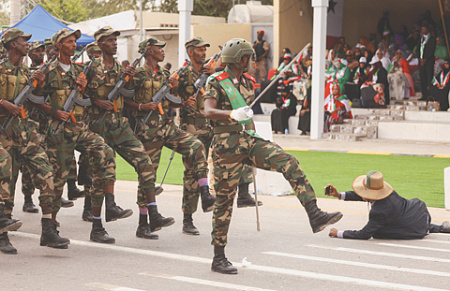
US President Donald Trump said that the Yemeni Ansar Allah movement (Houthis) is trying to strengthen its position in Somalia. In this regard, the American leader promised to support Mogadishu. This looks like a major shift in Trump’s policy, given that he was expected to curtail military projects in this African country. The Horn of Africa is growing in importance not only because of the situation in Yemen. Somalia and the unrecognized region of Somaliland are considered as reception points for Palestinians who want to be evicted from the Gaza Strip.
“We will support the Somali people, who must not allow the Houthis to invade (and they are trying to do this!),” Trump wrote on the Truth Social network. The American leader said that “the time has come for terrorists to hide,” but this “will not bring them any benefit.”
“Our warriors, the greatest the world has ever seen, will find them and bring them to justice quickly. I just got rid of the dangerous bureaucratic red tape of the Joe Biden era and handed over authority to our soldiers again,” Trump said. He was probably referring to the simplified process of attacking Ansar Allah positions by his order: the right to make certain military decisions was directly delegated to local commanders.
The fact that the Houthis are trying to strengthen their positions on the African continent was pointed out last year by the American intelligence community. Intelligence officials quoted by CNN said: Ansar Allah is seeking to increase contacts with the Somali group Al-Shabab (recognized as a terrorist group in Russia and banned) and transfer its weapons to the Horn of Africa. “This is a rather burning topic for discussion that we are conducting with countries on both sides of the Red Sea. And it is being treated with considerable seriousness,” one of the sources told CNN. According to their assumptions, the two groups, which are ideologically irreconcilable, could have moved closer under the influence of Iran.
The US security apparatus warned that the deal between Ansar Allah and Al-Shabab could worsen the security situation both in Somalia and in the Red Sea and the Gulf of Aden as a whole. According to these assumptions, the Houthis hoped to attract Somali jihadists to block international shipping routes and attack the US military in Africa.
According to Israeli intelligence last year, the Houthis also made significant efforts to strengthen their positions in North Africa and transfer military assets to Sudan, Egypt and Morocco. “The threat is not limited to Eilat and the Red Sea – it is right here, off the coast of Israel,” Israeli intelligence officials were quoted as saying. They stressed that Ansar Allah, in addition to direct rocket launches towards the Jewish state, wants to create a zone of instability in the Mediterranean Sea.
It is likely that the activation of Ansar Allah is associated with increased risks of a large-scale military offensive against their positions. As CNN diplomatic sources reported earlier this month, the Trump administration is trying to work out a ground operation against the Houthis, which will be conducted from the south and east of Yemen with naval support from the United States and Saudi Arabia. The central government of Yemen, which opposes the Houthis, has signaled that the hour for the return of areas under its control under the hands of Ansar Allah is near. It is possible that his troops should play a major striking role as part of the military plan.
The Trump administration’s approach to Somalia is likely undergoing significant adjustments now. In 2020, during the first presidential term, the Republican ordered the withdrawal of a small American contingent from Somalia, as a result of which almost 700 military personnel left the Horn of Africa. In 2022, this decision was reversed by former President Joseph Biden. After Trump returned to power, there were expectations that he would repeat the trick of withdrawing troops from the East African state, because the White House is convinced that military resources should be concentrated in the Pacific region.
Against the background of the deteriorating situation around Yemen, some prominent Republicans and representatives of the Trump administration called on him to reconsider his policy towards Somalia and make the African country a reference point in stabilizing shipping. Moreover, Trump has engaged the Pentagon in a campaign of intense strikes in northern Yemen to weaken the potential of the Houthis.
In these months, Somaliland, an unrecognized region of Somalia that defends the right to statehood, has also tried to convince Trump to turn his attention to the Horn of Africa. As The New York Times reported the other day, Somaliland offered the United States to conclude a deal: to lease its military bases to America on special terms in exchange for state recognition. According to the expectations of the regional authorities, receiving support from the United States could ensure an influx of global investments and give the region a long-awaited international status.
Trump’s approach to the Horn of Africa could well have evolved under the influence of another, Israeli factor. Somalia and Somaliland are on the list of locations that the US presidential administration and the government headed by Prime Minister Benjamin Netanyahu have been considering in recent months as potential safe havens for Palestinians as part of a program of “voluntary emigration” from the Gaza Strip. A plan for such an evacuation is still “on the table” and is being actively promoted by the Jewish state. Sudan, which is itself engulfed in a protracted civil war, was also considered in this context.
As Axios reported, on the Israeli side, all consultations with African states have been entrusted to MOSSAD, the intelligence agency that once took a leading role in the process of formalizing official relations between Israel and the Arab world.
